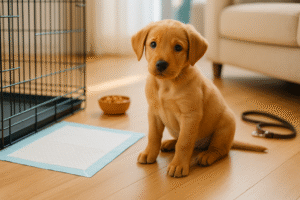What is House Training for Puppies?
House training (often called puppy potty training or housebreaking) is teaching your puppy where and when it’s appropriate to go potty. Instead of accidents on the rug, you want your puppy to learn a consistent routine—outside, in the right spot, and with praise for doing it correctly.
It’s one of the first and most important skills your puppy will learn. Done right, house training builds good habits, reduces frustration, and sets the foundation for a happy life together.
How Long Does House Training Take?
Every puppy is different. Some may pick it up in a few weeks, while others can take several months. On average, most puppies are fully house trained by 4–6 months of age, though small breeds may need more time.

Why Proper House Training Matters
Building Good Habits Early
Puppies are like sponges—they absorb routines quickly. Teaching bathroom manners early prevents bad habits from forming.
Reducing Stress for Pets and Owners
Accidents inside can be stressful and messy. Training correctly reduces frustration for you and confusion for your puppy.
Preventing Long-Term Behavioral Issues
Puppies that aren’t properly house trained may struggle with anxiety, marking, or destructive habits later in life. Early consistency avoids these problems.
Step-by-Step Basics of House Training Puppies
1. Establish a Consistent Potty Schedule
-
Take your puppy out first thing in the morning, after meals, naps, and playtime.
-
Puppies under 3 months may need a potty break every 1–2 hours.
2. Use Crates and Confinement Effectively
A crate isn’t punishment—it’s a safe den. Puppies naturally avoid soiling where they sleep, so crates help teach bladder control.
👉 For a detailed guide, check out our post: How to Crate Train a Puppy in 7 Days.
3. Reward Immediately with Positive Reinforcement
-
Use treats and enthusiastic praise within seconds of success.
-
Avoid delayed rewards—your puppy won’t make the connection.
4. Monitor Food and Water Intake
Scheduled feeding times help regulate potty breaks. Remove water bowls 2–3 hours before bedtime to reduce nighttime accidents.
Common House Training Mistakes to Avoid
Even with the best intentions, many puppy parents make mistakes that slow down progress. Here are the top errors to watch out for:
Inconsistent Potty Schedules
Skipping potty breaks or being inconsistent confuses your puppy. Puppies thrive on routine.
Punishing Accidents Instead of Redirecting
Scolding or rubbing a puppy’s nose in accidents only creates fear. Instead, calmly clean up and redirect your puppy outside.
Giving Too Much Freedom Too Soon
Allowing full run of the house before training is complete often leads to accidents in hidden corners. Use gates or pens until your pup is consistent.
Neglecting Nighttime Routines
Young puppies often need a midnight potty break. Expect to wake up once or twice in the early weeks.
Failing to Clean Accidents Properly
Ordinary cleaners leave behind odor traces that encourage repeat accidents. Always use an enzyme cleaner to break down urine scent.
Solutions & Fixes for House Training Problems
Frequent Accidents
-
Review feeding/watering schedules.
-
Take more frequent potty trips.
-
Limit freedom indoors until progress improves.
Busy Pet Parents & Work Schedules
If you’re gone for long hours, consider:
-
Hiring a dog walker
-
Doggy daycare
-
Using a safe potty area with pee pads temporarily
Stubborn or Slow-Learning Puppies
Some puppies just need more patience. Double down on consistency, and never punish mistakes.
When to Seek Professional Help
If your puppy shows signs of anxiety, refuses to go outside, or still struggles after 6–8 months, consider working with a certified dog trainer.
Best Tools & Products for Puppy House Training
Crates and Playpens
Choose a crate large enough for your puppy to stand, turn, and lie down—but not so large that they can potty in one corner.
Puppy Pee Pads vs. Outdoor Training
-
Pee pads are helpful for apartment living but can confuse some puppies.
-
Outdoor training is usually faster for long-term success.
Enzyme Cleaners for Accidents
Products like Nature’s Miracle break down urine odors at the molecular level.
Training Clickers and Treat Pouches
Clicker training helps mark the exact moment your puppy succeeds, reinforcing learning.
Expert Tips for Successful Puppy House Training
-
Set age-appropriate expectations: A 10-week-old pup cannot hold it as long as a 6-month-old.
-
Combine crate training with potty training: It reinforces routine.
-
Keep everyone consistent: All family members should follow the same commands and routines.
-
Socialize while house training: Trips outside can double as mini socialization sessions.
👉 Related reading: Puppy Potty Training Tips
FAQs About House Training Puppies
How long does it take to fully house train a puppy?
Most puppies take 4–6 months, though small breeds may need more time. Consistency and patience are key.
Should I use pee pads or go straight outdoors?
Outdoors is best, but pee pads can be a temporary solution for apartment living or young puppies.
What if my puppy keeps peeing inside after training?
Reassess routines, clean accident spots thoroughly, and increase outdoor trips. If issues persist, consult a trainer or vet.
Can older dogs be re-trained?
Yes! Older dogs can learn with the same techniques, though it may take longer due to established habits.
How often should I take my puppy outside?
Puppies under 12 weeks may need to go every 1–2 hours. As they age, they can hold it longer.
Conclusion
House training puppies takes time, patience, and consistency, but avoiding common mistakes will speed up the process. Remember:
-
Stick to a consistent schedule.
-
Reward good behavior immediately.
-
Use the right tools and products.
-
Avoid punishment—focus on teaching, not scolding.
With the right approach, your puppy will be reliably house trained, and you’ll both enjoy a cleaner, happier home.
👉 Ready for the next step? Explore our full Puppy Care Guide to raise a healthy, well-behaved dog.

